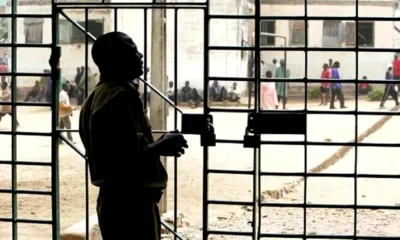National News
NCoS partners Hope Behind Bars to commemorate World Menstrual Day

To commemorate World Menstrual Hygiene Day 2025, Hope Behind Bars a leading non-governmental organization advocating for justice and gender equity in Nigeria’s correctional system, has spearheaded an outreach aimed at promoting menstrual health and dignity among female inmates across custodial centres in Nigeria.
The initiative, in collaboration with the Nigerian Correctional Service (NCoS) through its Gender Unit, focused on breaking the stigma surrounding menstruation and supporting the wellbeing of incarcerated women.
This year’s global theme, “Together, We Can Break the Silence and End the Stigma – Menstrual Health for All,” underscored the importance of inclusivity and health equity—values that guided the outreach effort.
At Suleja Medium custodial Centre, Hope Behind Bars distributed menstrual hygiene kits, including sanitary pads, tissue paper, soap, and drinks, to women in custody.
The campaign also featured educational sessions on menstrual hygiene management and menopause, highlighting the right of women to dignified and informed healthcare—even behind bars.
Speaking during the flagship event at Suleja Custodial Centre, Dr. Adenike Sheyindemi, who represented the Controller General of Corrections, emphasized that “care for inmates is not a privilege, but a right.”
She noted that the NCoS, under the leadership of CGC Sylvester Ndidi Nwakuche, has consistently supported female inmates through the Welfare and Gender Units, and was proud to work alongside civil society organizations like Hope Behind Bars to expand these efforts.
Deputy Controller of Corrections (Medical), Olisa Charlotte, and Chief Superintendent of Corrections, Christiana Etuokwu, led enlightening sessions for inmates on safe menstrual practices and managing menopause, dispelling myths and fostering awareness.
This impactful collaboration between NCoS and Hope Behind Bars not only provided essential supplies but also reinforced the importance of dignity, education, and advocacy in Nigeria’s correctional institutions.
It also reflects a growing movement toward rights-based, gender-sensitive reforms within the nation’s justice system.
-

 Entertainment2 days ago
Entertainment2 days agoYul Edochie unveils face of newborn daughter
-

 National News2 days ago
National News2 days agoAmaechi a golden fish, an asset to my government – Buhari
-

 Metro News24 hours ago
Metro News24 hours agoPanic as IBEDC staff electrocuted while fixing power line
-

 Metro News2 days ago
Metro News2 days agoWike shuns Tinubu’s directive over unseal of PDP headquarters
-

 Metro News1 day ago
Metro News1 day agoTears flow as gospel minister Big Bolaji is laid to rest in Ibadan
-

 Politics1 day ago
Politics1 day agoCUPP tags Tinubu’s 2 years in office as worse in history of Nigeria
-

 Crime and Law1 day ago
Crime and Law1 day agoBandits invade Niger communities, kill villagers, burn JTF camp
-

 National News2 days ago
National News2 days agoPopular Kenyan author, Ngugi Wa Thiong’o announced dead































